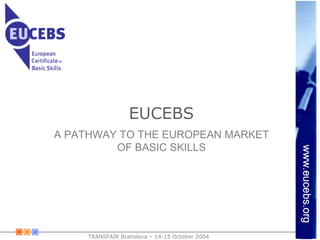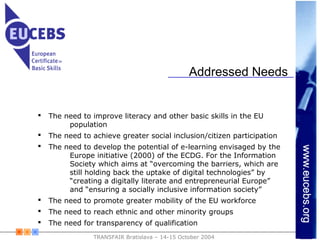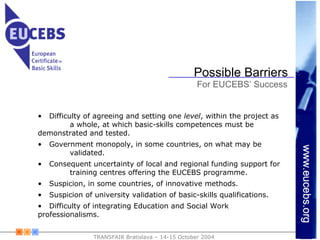TransFair Bratilslava 14-16 October 2004
- 1. EUCEBS TRANSFAIR Bratislava – 14-15 October 2004 A PATHWAY TO THE EUROPEAN MARKET OF BASIC SKILLS
- 2. ABOUT EUCEBS EUCEBS = EUropean CErtificate of Basic Skills Partners: The University of Edinburgh, UK (promotor) Andragoski centre Slovenije, Slovenia Centre Populaire d’Enseignement, Marseille, France Consorzio Universitario della Provincia di Ragusa, Italy CEJAC – Barcelona, Spain Deutsches Rotes Kreuz, Kreisverband Bremen, Germany Kerry Education Service, Ireland University of Craiova, Faculty of Economic Science Drobeta Turnu Severin, Romania European Trade Union – Bruxelles, Belgium The UK Basic Skills Agency TRANSFAIR Bratislava – 14-15 October 2004
- 3. Project Rationale To develop multi-lingually, for a European market, six-part, competence-based certification that will “make visible” to employers what those who gain the certification can do. The standard required of candidates for certification will be the same in each European country. The six parts, or domains, of the certification are Communication, Numeracy, ICT, Learning to Learn, Interpersonal Skills and Citizenship. TRANSFAIR Bratislava – 14-15 October 2004
- 4. Specific Aims To work as a partnership team to develop and make available, for pilot groups of trainees, a European-standard qualification in Basic Skills that can be attained in an on- line learning environment; To make available, to the trainers who will teach and support these trainees, training in the use of the EUCEBS website To develop a Qualified EUCEBS Assessor award specific to 1. and 2. To contribute to the systematic development that is taking place, under the social partners’, the EC’s and CEDEFOP’s aegis, of the means for and portability of pan-European skills certification. TRANSFAIR Bratislava – 14-15 October 2004
- 5. Target Audience The project reached its target audience through contacts with The Local Agency of Workforce Occupation and through mass media publicity. Adults with no formal qualifications, early schools leavers, immigrants from non-European countries, gypsy travellers, prisoners, those not yet equipped for the information society, and those wishing to apply for jobs in a different European country from their own; Training and learning centres, social work services, government agencies, and the social partners. TRANSFAIR Bratislava – 14-15 October 2004
- 6. Addressed Needs The need to improve literacy and other basic skills in the EU population The need to achieve greater social inclusion/citizen participation The need to develop the potential of e-learning envisaged by the Europe initiative (2000) of the ECDG. For the Information Society which aims at “overcoming the barriers, which are still holding back the uptake of digital technologies” by “creating a digitally literate and entrepreneurial Europe” and “ensuring a socially inclusive information society” The need to promote greater mobility of the EU workforce The need to reach ethnic and other minority groups The need for transparency of qualification TRANSFAIR Bratislava – 14-15 October 2004
- 7. Exploitation and Dissemination The EUCEBS website (www.eucebs.org), Become a member of the CEDEFOP TRANSPARENCY and NON-FORMAL AND INFORMAL LEARNING Virtual Communities Engaged in dialogue with members of the European Commission responsible for Transparency and Non-formal and Informal Learning International conferences: - a paper on EUCEBS at the French Socrates-Leonardo National Agency's conference on Transparency, Bordeaux, March 2004; - a presentation of the EUCEBS ePortfolio prototype at the E- PORTFOLIO 2004 international conference in La Rochelle at the end of this month. Entered EUCEBS for the 2nd Grundtvig Adult Education Award to be given out by the European Association for Adult Education TRANSFAIR Bratislava – 14-15 October 2004 Carried out, International Level
- 8. Exploitation and Dissemination In Romania: - contacts with the Ministry of Education which have expressed their disponibility for certificate accreditation in the field of education and advised on future steps; - contacts with the Local Agency for Vocational Training of Adults, the National Agency of Workforce Occupation, the Ministry of Labour and Social Protection Partner’s web sites: - Romanian partner: www.svedu.ro/en/eucebs (English version) and www.svedu.ro/eucebs (Romanian version) - Slovenian partner: siae.acs.si/projects/o29/ - Ragusa University,www.unirg.it/Attivita/progetto%20eucebs.htm TRANSFAIR Bratislava – 14-15 October 2004 Carried out, National Level
- 9. Exploitation and Dissemination Presentation of a paper on EUCEBS in Florence in January, at a conference put on by Regione Toscana entitled "Focus on Competencies"; participations in nartional/international conferences contacts with massmedia, local National Agency of Workforce Occupation and the Ministry of Education in all participants’s countries. TRANSFAIR Bratislava – 14-15 October 2004 Planned
- 10. Present Results EUCEBS web site (www.eucebs.org) EUCEBS ePortfolio Pilot the certificate in the partner’s countries in own languages EUCEBS Evidence of Competencies : EUCEBS tests are being written at this moment in all partner countries. EUCEBS Certificate in Romania TRANSFAIR Bratislava – 14-15 October 2004
- 11. EUCEBS web site Available in seven languages Information on EUCEBS Access to the e-portfolio system Details of the certificates and competencies Used for dissemination of EUCEBS work Adheres to disability standards where possible TRANSFAIR Bratislava – 14-15 October 2004 Present Results
- 13. About EUCEBS Links to information for various interested persons Menu options
- 14. EUCEBS ePortfolio Student centred learning Accreditation of prior learning e-portfolio is being used as an alternative alongside traditional testing Student/tutor management system Reflection potential – reflective diary TRANSFAIR Bratislava – 14-15 October 2004 Present Results
- 18. EUCEBS Certificate in Romania TRANSFAIR Bratislava – 14-15 October 2004 Present Results
- 19. Future Results and Plans On-line accreditation will be available in all domains Accreditation of Certificate at the European level and in each partner country of the project Certificate Interoperable with the Europass documentation Registration of adult training centres with EUCEBS with a consequent exponential building up of opportunities for trainee to acquire the Certificate Provision of governmental financial grants to training centres for trainees to attain the Certificate Training provision for people most at a disadvantage in the labour market TRANSFAIR Bratislava – 14-15 October 2004
- 20. Interaction with the Europass documents EUCEBS has a project-specific ePortfolio allowing artefacts to be lodged in evidence of each competence in each domain. This portfolio will be interoperable with the Europass documentation that are being worked on in order to become operational and available in 2005. We are thinking and hoping for our EUCEBS candidates who passed all the competencies in a EUCEBS domain to fill in electronically the European Certificate Supplement Document as part of the Europass documentation. In this way our project answers the demands of the European Parliament for an improved transparency of qualifications and competencies that will facilitate mobility throughout Europe, therefore contributing to the development of quality education and training. TRANSFAIR Bratislava – 14-15 October 2004 Future Results and Plans
- 21. Added Values The EUCEBS Slovenian partner, the Slovenian Institute for Adult Education (SIAE), are leading EUCEBS in this aspect, as they are overall responsible for our Qualified EUCEBS Assessor award. This award, like our other certification, will sit within an own EUCEBS verification framework, which we are developing trans-nationally to be pan-European, under our own brand name in line with the recommendations to Training 2010 of the EC Expert Group on Non- Formal and Informal Learning. We are seeking the endorsement of the qualifications authorities (the Ministry of Education) in the EUCEBS partner countries and, in sofar as possible, transparency with their services. TRANSFAIR Bratislava – 14-15 October 2004 Future Results and Plans
- 22. Possible Barriers • Difficulty of agreeing and setting one level, within the project as a whole, at which basic-skills competences must be demonstrated and tested. • Government monopoly, in some countries, on what may be validated. • Consequent uncertainty of local and regional funding support for training centres offering the EUCEBS programme. • Suspicion, in some countries, of innovative methods. • Suspicion of university validation of basic-skills qualifications. • Difficulty of integrating Education and Social Work professionalisms. TRANSFAIR Bratislava – 14-15 October 2004 For EUCEBS’ Success
- 23. EUCEBS Plans TRANSFAIR Bratislava – 14-15 October 2004 for sustaining the project results after the end of the project EUCEBS Foundation Headquarters of our not- for-profit company (location ?) Validation procedures Continuing R&D (new LdV project? New partners?) National Testing Centres (in contact with EUROPASS) (The initial testing centres are the current partner agencies) UKSiRoIrlIFrEsDe Learning Centres, SME’s (De) Learning Centres, SME’s (Es) Learning Centres, SME’s (Fr) ETC…
- 24. TRANSFAIR Bratislava – 14-15 October 2004 Thank You Ecaterina Paun ecatrerina.paun@ucv.ro
























